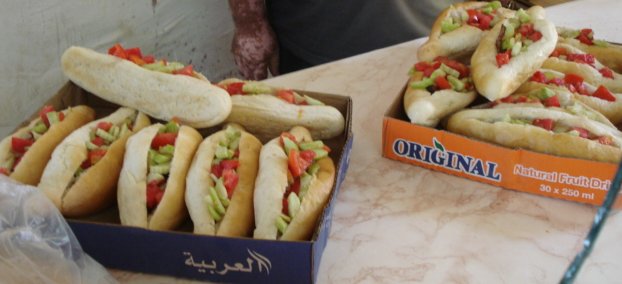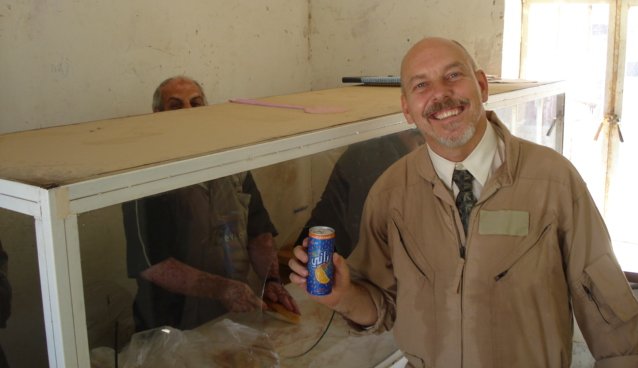
The ordinary is the extraordinary in a place like Anbar. I was reminded of that during a recent visit to a falafel stand in Hadithah. Instead of the usual chow hall fare, we decided to go out for lunch. It was a big deal, requiring a convoy, but I think it was worth it. The shop owner was delighted to have us come in and I think we contributed to the general feeling that peace and normality is returning to this recently-war-torn city. Reports of these kinds of gestures pass by word of mouth and have strong impact on local attitudes. Of course, we are not the first. The Marines at the nearby camp are the ones who told us about the shop, so they presumably have eaten here too.
Here I am with a can of Rani. Rani is a very sweet fruit-float drink. It comes in orange, peach, lemon, pineapple, and mango flavors. With the exception of the mango, I like it a lot, which is why I posed in the semi-advert position. I have not seen it in America. We got fifteen falafel sandwiches, plus Rani, for 15000 dinar, which is around fifteen dollars. The owner said that we could have the food for free, since he was happy with the safety he now enjoyed, but we insisted on paying, which I think was his real desire too. It was nice that he made the courteous gesture.

The owner of the falafel shop told us that he had come to Hadithah because he wanted to avoid the trouble in Baghdad, because there was more opportunity in Hadithah and because he thought it was generally a better place to live and raise a family. This presents us with an interesting definitional dilemma.
Is this man a refugee or an internally displaced person? I would say no.
He is by the definition we commonly use and I am sure relief groups would count him among those they seek money to support. But he did not flee any specific violence or persecution, according to what he told us and he does not intend to return to Baghdad, even if/when conditions significantly improve. He is actually much more like someone who flees the crime and bad schools of a big city to start a new life in a small town. This is not a refugee problem that will be solved because those actually involved are not really looking for a solution. I have seen similar situation on other occasions. It makes me skeptical every time I see a news report that set the numbers of refugees at x or y. People move for lots of reasons and the line between a migrant and a refugee is often very broad and indistinct.
An interesting digression involves the location of this falafel shop. I remember the building well because it used to be the headquarters of Lima Company. The Marines moved out a couple months ago and I guess this guy, among others, moved in. I wonder if he is aware of the history of his location.
My friend Major John Jarrard used to work out of this building. He is a truly honorable man, a HS history teacher, part time Georgia farmer and Marine officer, who in the course of his tour of duty in Iraq saved a little girl’s life with an extraordinary effort to get her the treatment she needed for a heart condition.
The falafel shop seems a lot less heroic than the Marines who were there before, but maybe not. The shop owner faced hardships and danger and now he is starting a new life and will in his small way contribute to the peace and prosperity of his country.
That too is heroism.
